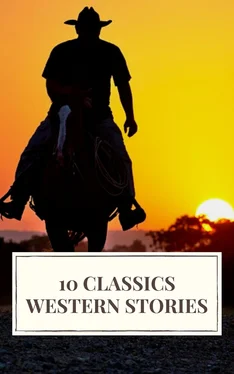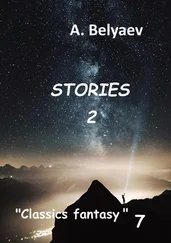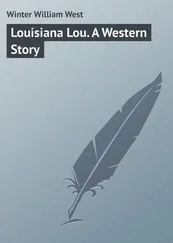A moment of strained, commanding expectation: then the answer came; the sign was given. The earth shook beneath him till he staggered, almost fell; the hut creaked and swayed like a storm-driven wreck; and through the crevices on the side toward Mount Hood came a blinding burst of flame. Down from the great gap in the Cascade Range through which flows the Columbia rolled the far-off thundering crash which had so startled Cecil and appalled the tribes. Then, tenfold louder than before, came again the roar of the volcano.
Too well Multnomah knew what had gone down in that crash; too well did he read the sign that had been given. For a moment it seemed as if all the strength of his heart had broken with that which had fallen; then the proud dignity of his character reasserted itself, even in the face of doom.
“It has come at last, as the wise men of old said it would. The end is at hand; the Willamettes pass like a shadow from the earth. The Great Spirit has forsaken us, our tomanowos has failed us. But my own heart fails me not, and my own arm is strong. Like a war-chief will I meet that which is to come. Multnomah falls, but he falls as the Bridge has fallen, with a crash that will shake the earth, with a ruin that shall crush all beneath him even as he goes down.”
Turning away, his eyes fell on the body of his wife as he passed toward the door. Aroused and desperate as he was, he stopped an instant and looked down at her with a long, lingering look, a look that seemed to say, “I shall meet you ere many suns. Death and ruin but give you back to me the sooner. There will be nothing between us then; I shall understand you at last.”
Then he drew his robe close around him, and went out into the night.
Part 5 THE SHADOW OF THE END.
Chapter 1 THE HAND OF THE GREAT SPIRIT.
“We view as one who hath an evil sight,”
He answered, “plainly objects far remote.”
Carey: Dante .
The night came to an end at last,—a night not soon forgotten by the Oregon Indians, and destined to be remembered in tale and tomanowos lore long after that generation had passed away. The sky was thick with clouds; the atmosphere was heavy with smoke, which, dense and low-hanging in the still weather, shut out the entire horizon. The volcano was invisible in the smoky air, but its low mutterings came to them from time to time.
The chiefs met early in the grove of council. Multnomah’s countenance told nothing of the night before, but almost all the rest showed something yet of superstitious fear. Mishlah’s face was haggard, his air startled and uneasy, like that of some forest animal that had been terribly frightened; and even Snoqualmie looked worn. But the greatest change of all was in Tohomish. His face was as ghastly as that of a corpse, and he came into the council walking in a dull lifeless way, as if hardly aware of what he was doing. Those nearest to him shrank away, whispering to one another that the seer looked like a dead man.
Cecil came last. The severe mental conflict of the past night had told almost fatally on a frame already worn out by years of toil and sickness. His cheek was pale, his eye hollow, his step slow and faltering like one whose flame of life is burning very low. The pain at his heart, always worse in times of exhaustion, was sharp and piercing.
He looked agitated and restless; he had tried hard to give Wallulah into the hands of God and feel that she was safe, but he could not. For himself he had no thought; but his whole soul was wrung with pain for her. By virtue of his own keen sympathies, he anticipated and felt all that the years had in store for her,—the loneliness, the heartache, the trying to care for one she loathed; until he shrank from her desolate and hopeless future as if it had been his own. All his soul went out to her in yearning tenderness, in passionate desire to shield her and to take away her burden.
But his resolution never wavered. Below the ebb and flow of feeling, the decision to make their separation final was as unchanging as granite. He could not bear to look upon her face again; he could not bear to see her wedded to Snoqualmie. He intended to make one last appeal to the Indians this morning to accept the gospel of peace; then he would leave the council before Wallulah was brought to it. So he sat there now, waiting for the “talk” to begin.
The bands gathered around the grove were smaller than usual. Many had fled from the valley at dawn to escape from the dreaded vicinity of the smoking mountains; many hundreds remained, but they were awed and frightened. No war could have appalled them as they were appalled by the shaking of the solid earth under their feet. All the abject, superstition of their natures was roused. They looked like men who felt themselves caught in the grasp of some supernatural power.
Multnomah opened the council by saying that two runners had arrived with news that morning; the one from the sea-coast, the other from up the Columbia. They would come before the council and tell the news they had brought.
The runner from the upper Columbia spoke first. He had come thirty miles since dawn. He seemed unnerved and fearful, like one about to announce some unheard-of calamity. The most stoical bent forward eagerly to hear.
“ The Great Spirit has shaken the earth, and the Bridge of the Gods has fallen! ”
There was the silence of amazement; then through the tribes passed in many tongues the wild and wondering murmur, “The Bridge of the Gods has fallen! The Bridge of the Gods has fallen!” With it, too, went the recollection of the ancient prophecy that when the Bridge fell the power of the Willamettes would also fall. Now the Bridge was broken, and the dominion of the Willamettes was broken forever with it. At another time the slumbering jealousy of the tribes would have burst forth in terrific vengeance on the doomed race. But they were dejected and afraid. In the fall of the Bridge they saw the hand of the Great Spirit, a visitation of God. And so Willamette and tributary alike heard the news with fear and apprehension. Only Multnomah, who knew the message before it was spoken, listened with his wonted composure.
“It is well,” he said, with more than Indian duplicity; “the daughter of Multnomah is to become the wife of Snoqualmie the Cayuse, and the new line that commences with their children will give new chiefs to head the confederacy of the Wauna. The old gives way to the new. That is the sign that the Great Spirit gives in the fall of the Bridge. Think you it means that the war-strength is gone from us, that we shall no longer prevail in battle? No, no! who thinks it?”
The proud old sachem rose to his feet; his giant form towered over the multitude, and every eye fell before the haughty and scornful glance that swept council and audience like a challenge to battle.
“Is there a chief here that thinks it? Let him step out, let him grapple with Multnomah in the death-grapple, and see. Is there a tribe that thinks it? We reach out our arms to them; we are ready. Let them meet us in battle now, to-day, and know if our hearts have become the hearts of women. Will you come? We will give you dark and bloody proof that our tomahawks are still sharp and our arms are strong.”
He stood with outstretched arms, from which the robe of fur had fallen back. A thrill of dread went through the assembly at the grim defiance; then Snoqualmie spoke.
“The heart of all the tribes is as the heart of Multnomah. Let there be peace.”
The chief resumed his seat. His force of will had wrung one last victory from fate itself. Instantly, and with consummate address, Multnomah preoccupied the attention of the council before anything could be said or done to impair the effect of his challenge. He bade the other runner, the one from the sea-coast, deliver his message.
Читать дальше












